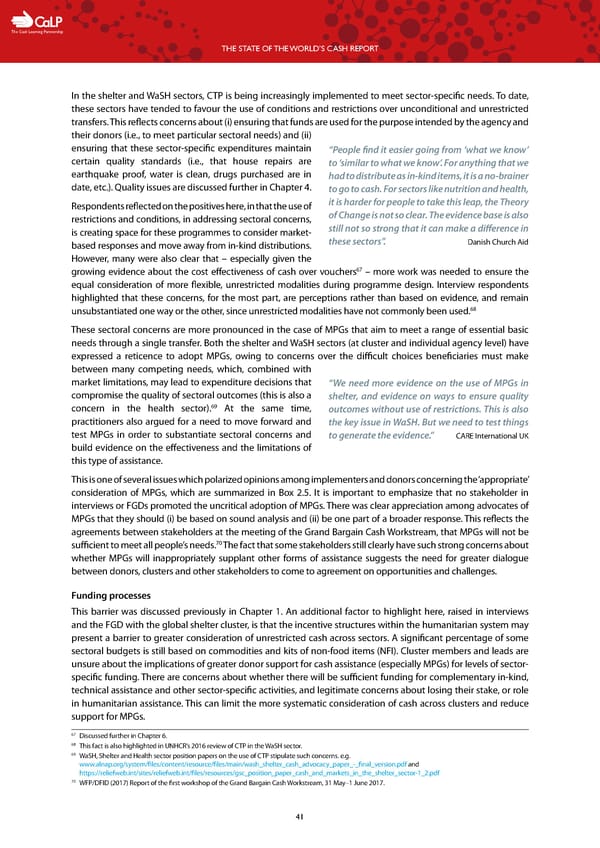C The Cash Learning Partnership THE STATE OF THE WORLD’S CASH REPORT In the shelter and WaSH sectors, CTP is being increasingly implemented to meet sector-specific needs. To date, these sectors have tended to favour the use of conditions and restrictions over unconditional and unrestricted transfers. This reflects concerns about (i) ensuring that funds are used for the purpose intended by the agency and their donors (i.e., to meet particular sectoral needs) and (ii) ensuring that these sector-specific expenditures maintain “People find it easier going from ‘what we know’ certain quality standards (i.e., that house repairs are to ‘similar to what we know’. For anything that we earthquake proof, water is clean, drugs purchased are in had to distribute as in-kind items, it is a no-brainer date, etc.). Quality issues are discussed further in Chapter 4. to go to cash. For sectors like nutrition and health, Respondents reflected on the positives here, in that the use of it is harder for people to take this leap, the Theory restrictions and conditions, in addressing sectoral concerns, of Change is not so clear. The evidence base is also is creating space for these programmes to consider market- still not so strong that it can make a difference in based responses and move away from in-kind distributions. these sectors”. Danish Church Aid However, many were also clear that – especially given the 67 growing evidence about the cost effectiveness of cash over vouchers – more work was needed to ensure the equal consideration of more flexible, unrestricted modalities during programme design. Interview respondents highlighted that these concerns, for the most part, are perceptions rather than based on evidence, and remain 68 unsubstantiated one way or the other, since unrestricted modalities have not commonly been used. These sectoral concerns are more pronounced in the case of MPGs that aim to meet a range of essential basic needs through a single transfer. Both the shelter and WaSH sectors (at cluster and individual agency level) have expressed a reticence to adopt MPGs, owing to concerns over the difficult choices beneficiaries must make between many competing needs, which, combined with market limitations, may lead to expenditure decisions that “We need more evidence on the use of MPGs in compromise the quality of sectoral outcomes (this is also a shelter, and evidence on ways to ensure quality 69 concern in the health sector). At the same time, outcomes without use of restrictions. This is also practitioners also argued for a need to move forward and the key issue in WaSH. But we need to test things test MPGs in order to substantiate sectoral concerns and to generate the evidence.” CARE International UK build evidence on the effectiveness and the limitations of this type of assistance. This is one of several issues which polarized opinions among implementers and donors concerning the ‘appropriate’ consideration of MPGs, which are summarized in Box 2.5. It is important to emphasize that no stakeholder in interviews or FGDs promoted the uncritical adoption of MPGs. There was clear appreciation among advocates of MPGs that they should (i) be based on sound analysis and (ii) be one part of a broader response. This reflects the agreements between stakeholders at the meeting of the Grand Bargain Cash Workstream, that MPGs will not be 70 sufficient to meet all people’s needs. The fact that some stakeholders still clearly have such strong concerns about whether MPGs will inappropriately supplant other forms of assistance suggests the need for greater dialogue between donors, clusters and other stakeholders to come to agreement on opportunities and challenges. Funding processes This barrier was discussed previously in Chapter 1. An additional factor to highlight here, raised in interviews and the FGD with the global shelter cluster, is that the incentive structures within the humanitarian system may present a barrier to greater consideration of unrestricted cash across sectors. A significant percentage of some sectoral budgets is still based on commodities and kits of non-food items (NFI). Cluster members and leads are unsure about the implications of greater donor support for cash assistance (especially MPGs) for levels of sector- specific funding. There are concerns about whether there will be sufficient funding for complementary in-kind, technical assistance and other sector-specific activities, and legitimate concerns about losing their stake, or role in humanitarian assistance. This can limit the more systematic consideration of cash across clusters and reduce support for MPGs. 67 Discussed further in Chapter 6. 68 This fact is also highlighted in UNHCR’s 2016 review of CTP in the WaSH sector. 69 WaSH, Shelter and Health sector position papers on the use of CTP stipulate such concerns. e.g. www.alnap.org/system/files/content/resource/files/main/wash_shelter_cash_advocacy_paper_-_final_version.pdf and https://reliefweb.int/sites/reliefweb.int/files/resources/gsc_position_paper_cash_and_markets_in_the_shelter_sector-1_2.pdf 70 WFP/DFID (2017) Report of the first workshop of the Grand Bargain Cash Workstream, 31 May–1 June 2017. 41
 The State of the World's Cash | Full Report Page 42 Page 44
The State of the World's Cash | Full Report Page 42 Page 44